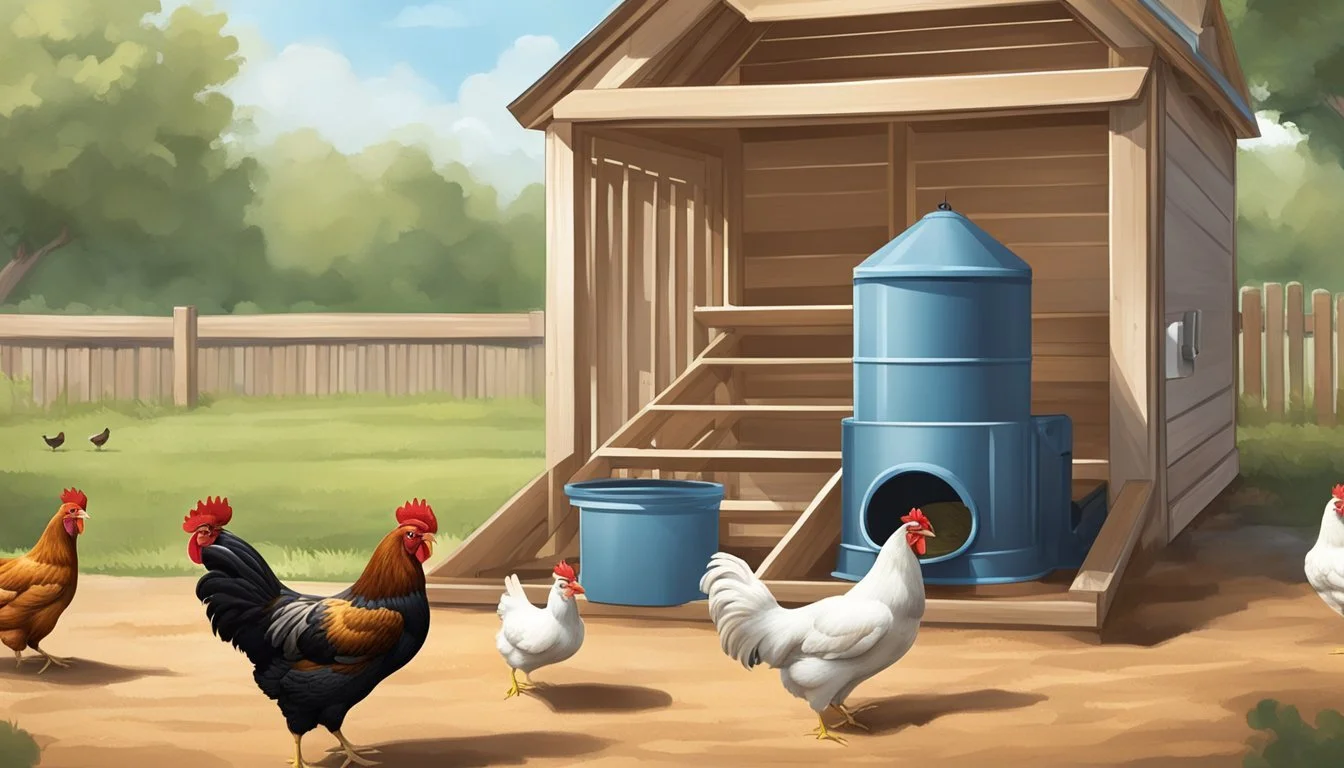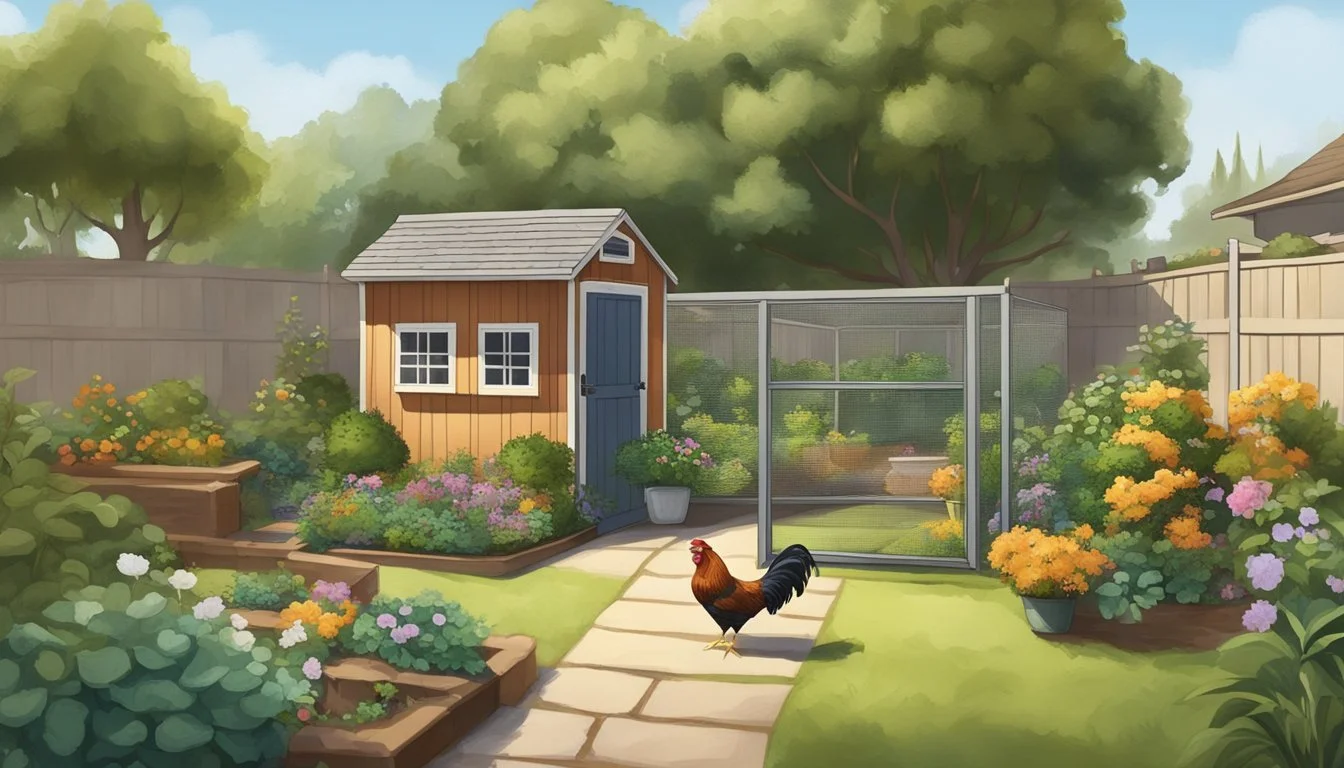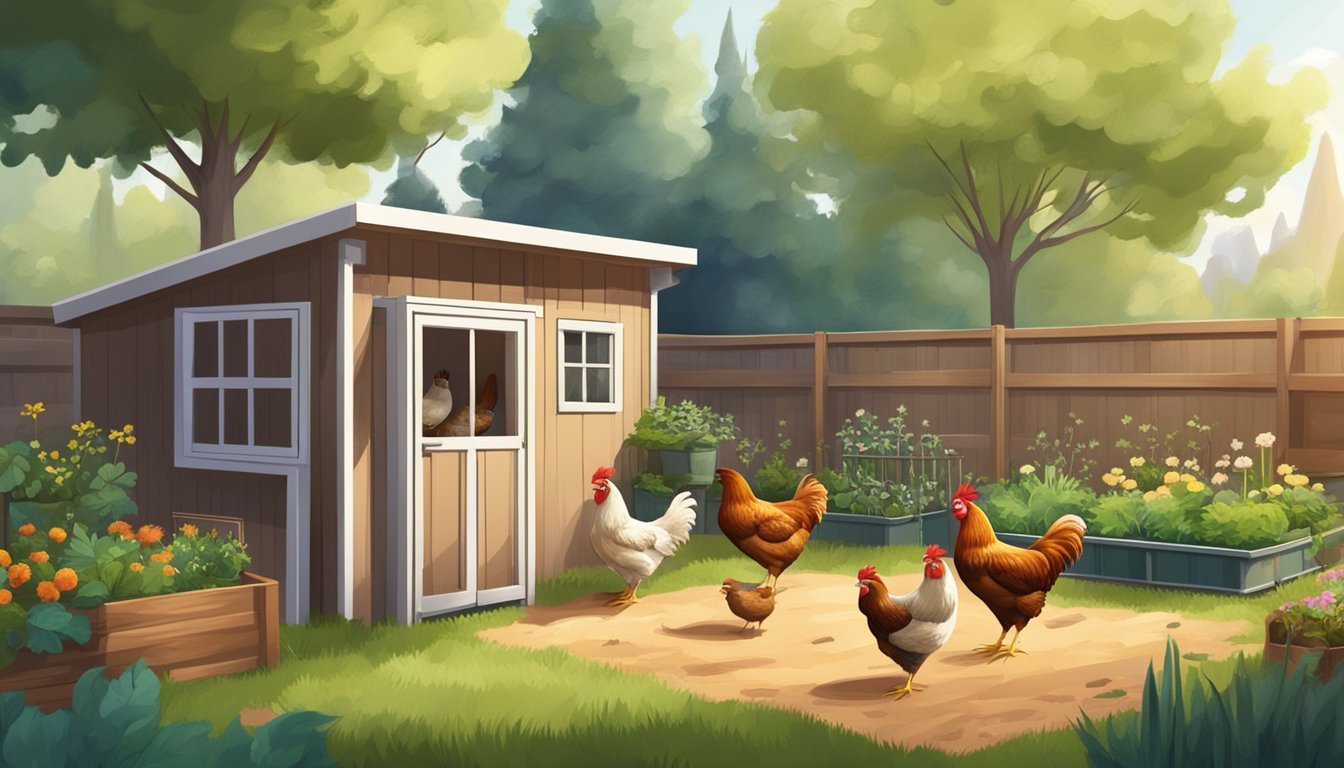Keeping Backyard Chickens in Garden Grove, CA
Essential Tips for Urban Poultry Farming
Keeping backyard chickens has become increasingly popular in many urban and suburban areas due to the sustainability and personal gratification it offers. Garden Grove, California, is a city that allows residents to partake in this growing trend under specific guidelines. Raising chickens in the backyard offers families in Garden Grove a unique opportunity to connect with a source of fresh eggs, while also learning about animal husbandry and responsible pet ownership.
In Garden Grove, regulations are in place to ensure that the practice of raising backyard chickens does not disrupt the community. It is mandated that birds, including chickens, must be housed in an enclosure at all times. This structure must be appropriately designed for their safety and to prevent any public nuisance. Moreover, there is a specified minimum distance that chicken enclosures need to be maintained from neighboring dwellings and property lines to minimize disturbances such as noise and odor.
As urban homesteading gains traction, the residents of Garden Grove have the opportunity to foster a connection with their food sources through backyard chicken raising. With adherence to local ordinances designed to keep harmony in residential areas, families can successfully integrate this form of livestock into their everyday lives. It's a commitment that requires consideration of one's neighbors and the well-being of the chickens themselves, blending urban life with aspects of rural living.
Understanding Local Regulations
In the city of Garden Grove, California, keeping backyard chickens involves adhering to specific local regulations. This ensures that both chicken owners and their neighbors enjoy a harmonious environment.
City and Municipal Codes
In Garden Grove, one must review and comply with the city and municipal codes related to keeping fowl. These codes govern not just the keeping of chickens but also include specifications on the types of structures that are permissible (such as coops or pens) and how they should be maintained.
Enclosure Requirements: Chickens must be kept in a fully enclosed pen, coop, or cage.
Setbacks: The enclosure must maintain a minimum setback of 25 feet from all adjacent dwelling units and property lines.
Zoning and Permitting Requirements
Zoning regulations can impact the legality of keeping backyard chickens in residential areas. It is essential to check whether the local zoning ordinances permit poultry in the area where one resides. Additionally, some areas might require a permit before setting up a chicken coop.
Permit Information: Garden Grove residents should inquire with local authorities about any permitting processes necessary for keeping backyard chickens.
Ordinances Specific to Garden Grove
The city has enacted ordinances specific to Garden Grove that are designed to control the keeping of chickens to prevent nuisances and to protect public health. It is important for residents to familiarize themselves with these specifics to ensure full compliance.
Number of Chickens Allowed: The ordinance may specify the number of chickens that can be legally kept.
Noise and Odor Control: Measures should be taken to minimize disturbances such as noise and to manage waste effectively.
Residents who wish to keep backyard chickens must diligently follow these regulations to avoid penalties and to contribute to their community positively.
Setting Up the Coop and Run
In Garden Grove, California, setting up a coop and run for backyard chickens requires careful planning to ensure safety, comfort, and adherence to local ordinances.
Choosing the Right Location
When determining the location for a chicken coop and run, one must consider both safety and convenience. In Garden Grove, there is a requirement for the coop to maintain a minimum setback of twenty-five feet from all adjacent dwelling units and property lines. It is essential to choose a spot with adequate sunlight, natural shade, and protection from the elements.
Design and Features of Coops
The coop should be designed to provide a comfortable and secure shelter for the chickens. Key features include:
Flooring: Use solid materials like plywood for the floor, covered in peel-and-stick linoleum tile for easy cleaning.
Walls: Plywood walls and sturdy pine studs create the coop structure.
Roosting Space: Provide ample space for roosting poles where hens can sleep.
Nesting Boxes: Install one nesting box for every three to four hens.
Predator-Proofing Strategies
Predator-proofing is crucial to protect the flock from common threats such as raccoons and hawks. Strategies include:
Secure Enclosures: Ensure all pens, cages, and runs are fully enclosed with strong wire mesh.
Locking Doors: Fit coop doors with raccoon-proof latches.
Burial of Mesh: Extend mesh fencing at least 12 inches underground to prevent digging predators.
Run Space and Set-up
Chicken runs offer birds the opportunity to exercise, forage, and exhibit natural behaviors. The run should:
Be attached to the coop with an easily accessible door.
Include a fenced-in play yard area that is roofed to protect from aerial predators.
Provide sufficient space for the chickens to roam — typically at least 10 square feet per chicken.
By considering these factors, residents of Garden Grove can create a safe and comfortable environment for their backyard chickens.
Caring for Your Chickens
Proper care for chickens involves comprehensive feeding, health checks, cleanliness, and egg handling practices — critical for the well-being of your Garden Grove backyard flock.
Feeding and Nutrition
Chickens require a balanced diet rich in proteins, vitamins, and minerals. Layers’ pellets form the staple of their diet, complemented by grains, seeds, and kitchen scraps. It's important to provide:
Fresh water daily
Grit to aid digestion
Consistent access to food and water helps maintain healthy egg production and supports the overall health of the chickens.
Health and Wellness Monitoring
Regular health assessments are crucial to identify and address potential issues early. Keepers should:
Check for parasites and signs of illness
Schedule routine veterinary checkups
Maintaining a record of health checks can be helpful to monitor the flock's well-being over time.
Maintaining Cleanliness
A clean environment is essential for the health of the flock. Their living area should be:
Cleaned weekly
Bedding changed to prevent parasites and diseases
Clean coops contribute to lower stress levels in chickens, promoting better egg laying.
Laying and Egg Collection
The process of laying eggs is natural for chickens but ensuring an optimal environment can improve egg production. Keepers should:
Collect eggs daily
Provide nesting boxes with clean, soft bedding
Fresh eggs should be stored properly to preserve their quality. A clean nesting area encourages chickens to lay their eggs in a designated place, simplifying collection.
Community and Legal Considerations
Residents of Garden Grove, California, need to be mindful of specific legal frameworks and community relations when keeping backyard chickens. Compliance with municipal codes and maintaining good neighborly relations are paramount.
Neighborhood Relations
The community's perspective can significantly affect one's experience in raising backyard chickens. Garden Grove city ordinances require that enclosures for fowl must be kept at least 25 feet from adjacent dwellings and property lines, minimally impacting neighbors. Homeowners should engage with their neighbors to address any concerns proactively.
Noise and Waste Management
Chickens can create noise, which may disturb the community, and managing waste is essential to prevent odors and maintain a clean environment. Garden Grove’s regulations emphasize the importance of keeping pens clean to avoid nuisances. It is crucial for owners to establish regular cleaning schedules and consider sound-dampening strategies for coops, such as strategic placement away from property lines and using noise-reducing materials.
Engaging with Local Chicken Communities
Connecting with local chicken enthusiasts can provide valuable support and advice. Organizations like BackYard Chickens (BYC) offer a platform for owners to share experiences and tips. Engaging with local groups can help new poultry keepers navigate Garden Grove’s rules and regulations, ensuring they adhere to best practices in urban chicken keeping.
Sustainable Practices
Maintaining a backyard flock in Garden Grove, California, can be both environmentally and economically beneficial when sustainable practices are employed. These techniques not only support the well-being of chickens but also enhance the garden ecosystem and reduce waste.
Composting Chicken Waste
One can transform chicken waste into a valuable resource for the garden through composting. Chicken manure, rich in nitrogen, can be combined with carbon-rich materials like straw, leaves, or sawdust in a compost pile or bin. The ratios usually recommended for effective composting consist of one part green material (manure) to two to three parts brown material (straw). Garden Grove residents should ensure there's proper aeration and moisture to facilitate the decomposition process, which can take between three to six months before the compost is ready to be used as a nutrient-rich soil amendment.
Integrating Chickens into Garden Ecosystems
Chickens can play a vital role in the garden beyond just providing eggs. They're excellent at controlling pests and weeds, thus minimizing the need for chemical interventions. For a more self-sufficient garden, chickens should be allowed to forage, which contributes to their diet diversity and reduces feed costs. They'll naturally aerate the soil with their scratching, assisting in the breakdown of organic matter. Gardeners in Garden Grove can create a rotational pasturing system, allowing chickens to graze on different sections of the garden while giving time for the land to recover, thereby enhancing soil fertility and garden health.
Troubleshooting Common Issues
When raising chickens in Garden Grove, CA, owners commonly face issues with predators, behavioral problems, and diseases. Addressing these challenges effectively is essential to maintaining a healthy and productive backyard flock.
Dealing with Predators and Pests
Predators such as raccoons, hawks, and neighbourhood pets pose significant threats to backyard chickens. To protect the flock, it is crucial to construct a sturdy coop that is impervious to predators. Hardware cloth should be used instead of chicken wire, as it is more durable and provides better protection. Securing the coop with locks and ensuring there are no gaps or weaknesses can deter most predators. Additionally, regular inspections for signs of pests like mites and lice are important. These can be managed with appropriate treatments and maintaining clean living conditions for the chickens.
Addressing Behavioral Problems
Chickens exhibit a range of behaviors that can lead to issues within the flock. For instance, pecking can escalate to aggression if not managed properly. Interventions include providing ample space to prevent overcrowding, creating separate areas for feeding, and offering distractions such as hanging vegetables. Consistent handling and monitoring of the chickens help in identifying and remedying such problems early.
Preventing and Managing Diseases
Chickens are susceptible to various diseases that can affect their health and egg production. Prevention strategies are paramount and include:
Vaccinations where applicable.
Regular deworming and parasite control.
Clean water and a balanced diet to boost overall health.
If illness occurs, early detection and treatment are key. Symptoms such as lethargy, ruffled feathers, or a drop in egg production signify the need for a closer examination and potential consultation with a veterinarian experienced in avian medicine.
Conclusion
This section synthesizes important takeaways and suggests actionable steps for residents interested in rearing backyard chickens in Garden Grove, CA.
Recap of Key Points
Garden Grove requires that chickens be kept in an enclosure with a minimum setback of 25 feet from dwellings and property lines.
Local regulations should be consulted to ensure compliance with all backyard chicken keeping laws in the city.
Next Steps for Chicken Enthusiasts
Prospective chicken owners should construct or secure a proper coop or enclosure adhering to the specified setbacks.
Individuals should stay informed on the latest ordinances by checking local resources for any updates to chicken keeping regulations.








